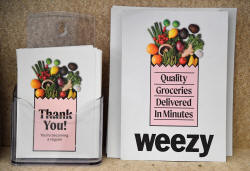Every second counts as startups race to deliver fresh
food
 Send a link to a friend
Send a link to a friend
 [May 20, 2021] By
Kate Holton, James Davey and Douglas Busvine [May 20, 2021] By
Kate Holton, James Davey and Douglas Busvine
LONDON (Reuters) - In a railway arch in south London, pickers and
packers are in a race against time: to get fresh food to the door of
Alastair Dean within 15 minutes of his order hitting an app.
Their company Weezy is part of a new army of European rapid delivery
firms that, backed by billions of dollars of venture capital from
Europe, the United States, China and Japan, are using electric bikes and
scooters to deliver groceries.
They have placed a bet that demand for convenience will drive the next
transformation in food retail and help crack the vice-like grip of the
big supermarket stores which, in Britain, supply 95% of the country's
groceries.
The boss of one of Europe's biggest supermarkets, speaking on condition
of anonymity, told Reuters that far from dismissing the new services as
hype, they could pose "death by a thousand nibbles" to the dominant
chains such as Tesco and Sainsbury's, Aldi and Lidl.
Weezy enables shopper Dean, a 32-year-old finance worker, to select
locally produced goods for delivery to his door for a fee of 2.95 pounds
($4.18). When ordering shaving foam he will throw in salad leaves for
dinner.

"Time is precious in the 21st century," he said on his doorstep in the
affluent London district of Pimlico. "The world of going and doing your
weekly shop, like I remember growing up – it's all completely changed.
We're always last minute."
The combination of cash, tech and the surge in online delivery in a
pandemic has shaken the kaleidoscope for the grocery industry, creating
new players, challenging others and providing a new frontier for
traditional supermarkets.
The trend has taken root across European cities, where e-commerce giant
Amazon has yet to properly gatecrash the grocery market.
In central London, residents have been bombarded with offers from at
least four new rapid services.
The likes of Weezy, Getir, Dija and Gorillas store goods from major
suppliers and local producers in urban mini-fulfilment centres to supply
customers at prices similar to supermarket convenience shops.
Holding up to 2,000 items instead of the more than 20,000 in
supermarkets, mini centres built for delivery rather than customers can
be picked quickly and located in cheaper areas.
Weezy co-founder Alec Dent said orders had jumped since Britain started
to unlock from COVID restrictions and people's lives became more
complicated. Once they know they can rely on 15-minute delivery, he
said, anything longer seems too slow.
Many start by ordering snacks and alcohol before adding sourdough bread,
vegetables, meats, herbs, fresh pasta, condoms, games and COVID tests,
to be delivered in brown paper bags.
"The industry is huge. It's a 200 billion pound market, and it's rapidly
moving online and rapidly moving in the direction of convenience," Dent
said of the British grocery sector.
AGGRESSIVE MOVES
Turkey's Getir has launched aggressively in London, with its purple and
yellow scooters seen on roads and billboards, after it raised $300
million in March, valuing it at $2.6 billion.

Berlin-based Gorillas has a valuation of more than $1 billion after it
raised $290 million, including from China's Tencent. "I strongly believe
our business model is going to be the new normal," Chief Executive Kagan
Sumer told Reuters.
U.S. operator Gopuff, valued at nearly $9 billion, has bought Fancy to
expand in Britain and Europe, while Dija has been backed by Creandum,
which invested in payments firm Klarna and Spotify.
Food-delivery riders from Deliveroo and Uber Eats will also bring
groceries from established supermarkets.
[to top of second column] |

Promotional leaflets for online supermarket Weezy are seen at their
Lambeth depot, amidst the expansion of rapid grocery delivery firms,
London, Britain, May 12, 2021. Picture taken May 12, 2021.
REUTERS/Toby Melville

The different services are testing minimum order fees and delivery charges, or
no restrictions at all, to see what works.
While the model has high costs and low margins, its riders are classed as
workers, giving them basic rights and making the groups less vulnerable to
future regulation. In full control of the supply chain, they can also deliver at
speed.
The challenge remains stark however, as seen in the finances of German-based,
26-billion-euro Delivery Hero.
Present in over 50 countries, the group has a long-term core-earnings margin
target of 5 to 8%. However its rapid commerce division traded at a margin of
minus 33% in 2020, its first year of operation.
Chief Executive Niklas Ostberg said all the emerging services were trying to
find new ways to make the already razor-thin margin business of food retail
work.
"It's no secret that this is very tough economically, but we have found a way to
make it work," Ostberg told Reuters ahead of the launch of its fast commerce
service in Germany.
Quick delivery operators say that low rents, ordering direct from suppliers and
the option for brands to pay to promote goods on an app all help.
FACING THE FUTURE
With so much activity, the supermarkets are watching and know they must respond
in time.
Online delivery has always posed a challenge, as supermarkets make more profit
when customers browse instore. But the pandemic turbocharged the trend, and
improved the economics of delivery. A record 16% of UK grocery sales were made
online in January.

Now they risk losing out to ultra fast delivery, or confronting the cost of
reconfiguring operations - most online orders are still picked by staff instore
alongside traditional shoppers, an option that does not work when time is key.
"Shareholders would say 'if I want to invest in immediate delivery, I'll just
invest direct'," said one senior executive at a major British supermarket of the
challenge ahead.
Tesco, Britain's biggest supermarket, is hedging its bets. While it is trialling
its own one-hour delivery with a 5 pound delivery fee, it is also building a
handful of automated urban fulfilment centres at the back of stores just for
online orders.
Ocado, an online pioneer which runs out-of-town warehouses and trucks to stock
the shelves of middle-class Britain, has partnered with a courier firm to test
faster orders in London.
Co-founder Tim Steiner questioned however just how many people would need
instant delivery. "I'm not saying it's a fad, but I think that some people's
expectations of the size of the market are massively out of whack," he said.
Still, the rapid delivery groups say the initial reaction has been strong, and
there is a road to profitability after consolidation. Shopper Dean is sold.
"We have a small kitchen with a small fridge," he said. "The convenience thing
is huge. Now we can finish work and fifteen minutes later we're cooking our
evening meal."
($1 = 0.7052 pounds)
(Writing by Kate Holton; Additional reporting by Nadine Schimroszik in Berlin;
Editing by Paul Sandle, Guy Faulconbridge and Jan Harvey)
[© 2021 Thomson Reuters. All rights
reserved.] Copyright 2021 Reuters. All rights reserved. This material may not be published,
broadcast, rewritten or redistributed.
Thompson Reuters is solely responsible for this content.
 |